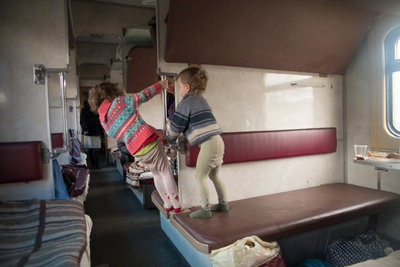By Chris Hennemeyer
Most weeks I take a gleaming high-speed train from my job as a humanitarian worker in eastern Ukraine to attend meetings in the capital city of Kiev. The spotless carriages fly across the bleak wintery countryside, filled with endless flat, black fields rimmed with dirty snow and gray birch trees, the only visual break the occasional knot of ramshackle houses clustered around some defunct, Soviet-era industry. This land looks much as it has for centuries, very much at home with the region's twin plagues of poverty and war. From the Tartars to the Cossacks, from the Nazis to the Red Army, the rich, dark earth here is fertilized with the blood of countless partisans and peasants, Jews and generals.
For a brief moment last year it appeared that Ukraine might break free of its grim history. An uprising forced out the former president, and there was a sense that, rather than continuing to look eastward towards Russia, the country might begin a new path towards European integration. Needless to say, this didn't sit well with Russia, nor did it appeal to many eastern Ukrainians, often ethnic Russians themselves. The result has been a bloody war -- Europe's deadliest since the Balkans -- replete with missile launchers, tanks, artillery, and over 5,000 dead.
Children play in a parked train car that's become a temporary home for hundreds of displaced in Slovyansk (photo by Volodymyr Nechaiev for CRS).
Despite a plethora of global crises demanding attention, the international community hasn't ignored Ukraine, but the focus is invariably geopolitical: What is Putin's end game? Should the West arm the Ukrainian forces? Will Ukraine be absorbed by a reborn Russian empire? Interesting and important questions, all of them, but what remains unsaid is the hideous human drama that is playing out. Each and every day without fail, rockets and mortars are launched into crowded cities, sometimes taking out an apartment block, sometimes a school bus or a hospital, sometimes a line of elderly people awaiting relief aid.
In the greater urban area of Donetsk -- which had a pre-war population of 2 million and boasted not only an opera and a ballet but that most iconic symbol of global acceptance, McDonald's -- buildings now lie in rubble, and stray dogs roam the streets feeding on bodies. Children who used to go to school, play football, and take violin lessons now huddle with their parents in bomb shelters and basements, flinching at the awful scream of Grad multiple rocket launchers.
Families are separated, with husbands often staying behind in the war zone to guard their property while bewildered women and children make their way to strange new cities hundreds of miles away, searching for a room to rent and a school that will accept newcomers. The UN reports that over 940,000 have fled their homes for other parts of Ukraine, and many others have crossed the border into Russia itself.
The elderly and disabled are particular at risk. Under Ukraine's social welfare system, a legacy of Soviet times, many received government support and free medical care. Given the country's de facto partition and the nearly empty Ukrainian treasury, this fragile safety net is fraying fast, with potentially devastating consequences for the most vulnerable. Humanitarian organizations like Catholic Relief Services and others are valiantly trying to fill the gap, but charities alone cannot and should not take on the responsibilities of governments.
Aid is arriving, although slowly and in much smaller quantities than needed. The UN, for example, has received virtually no responses to its most recent funding appeal, in part due to the competition from Syria, countries dealing with Ebola, South Sudan, the Central African Republic and a host of other countries. But it's not simply an excess of global emergencies that's the problem; it's the misplaced notion that what's happening here is merely a political puzzle, in a place replete with such riddles, something to be solved through summits and sanctions. In fact, it's much more than that: It's a humanitarian tragedy of the first order.
Chris Hennemeyer is a long-term relief worker, currently consulting for Catholic Relief Services in Ukraine.

